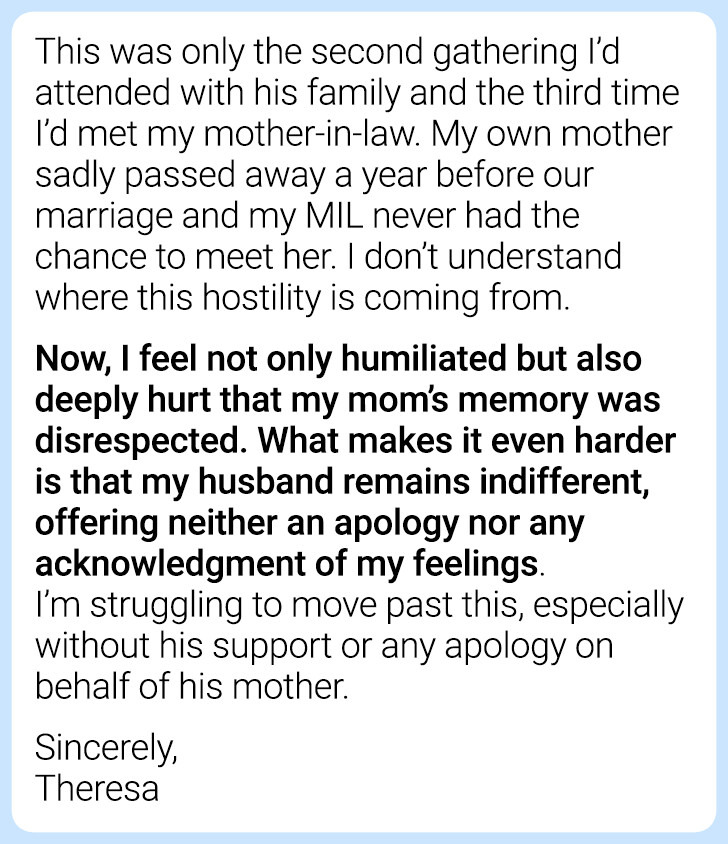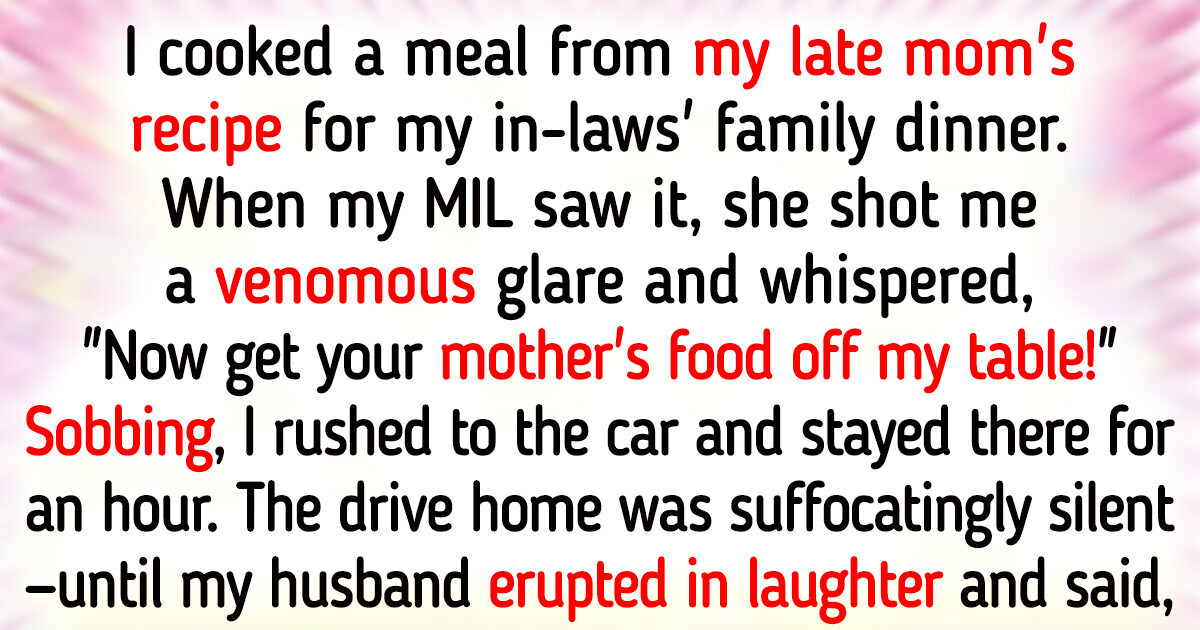My MIL Publicly Shamed Me for Bringing a Dish From My Late Mom’s Recipe to Her Family Reunion / Bright Side
Adjusting to family dynamics can be tough, particularly when you’re still finding your place. A newly married woman opened up about a difficult and painful incident with her MIL during a recent family reunion. What was meant to be a warm expression of affection and bonding swiftly turned into a moment of embarrassment and sorrow. Feeling disregarded and alone, she sought advice from Bright Side on how to navigate the situation.
She sent a letter, stating:


Thank you, Theresa, for sharing such a personal and heartbreaking story about your mother-in-law and husband. We’ve thoughtfully gathered the most helpful advice to assist you in navigating this challenging situation with understanding and clarity.
Communicate with empathy, not blame.
Talk to your husband in a composed manner and share how much the situation affected you. Focus on your feelings rather than assigning blame: “When your mom dismissed my mom’s recipe like that, it felt like she disrespected my mom’s memory, and I felt unsupported.” Let him know that his failure to acknowledge the situation, both during and after, intensified your hurt.
Ask him how he saw the incident and if he realized how his response—or lack of it—affected you. By fostering an open and non-judgmental conversation, you can help him understand your point of view and encourage greater empathy moving forward.
Establish clear limits with your mother-in-law.
Given your MIL’s hostility, it’s crucial to set clear boundaries early on. Calmly but assertively let her know that comments like hers are not acceptable, as they have a significant emotional impact on you. You might say something like, “I made that dish to share a piece of my mom with everyone, and it stung to have it rejected so abruptly.”
Emphasize that respect is a two-way expectation, and if possible, ask for a fresh start. Having a direct but respectful conversation can help prevent similar issues in the future and create a foundation for healthier interactions.
Turn to trusted individuals outside your marriage for support.
If your husband continues to be indifferent, reach out to someone you trust, like a close friend, sibling, or therapist, for emotional support. Sharing your feelings with an empathetic listener can help you process the pain and gain the confidence needed to address the issue more effectively.
A counselor can also guide you on how to approach your husband in a way that encourages understanding instead of triggering defensiveness. Seeking outside support can help you untangle your emotions and move forward with a clearer perspective.
Suggest attending a family counseling session together.
If the strain with your MIL continues and your husband remains dismissive of the problem, it might be helpful to propose a family counseling session. Present it as a chance to strengthen family connections rather than a form of discipline. Explain that you want to foster better understanding among everyone, particularly since you’re still adjusting to the family dynamic.
A neutral third party can facilitate conversations and help uncover any underlying issues, such as your MIL’s unexplained hostility. This approach could also encourage your husband to take the matter more seriously.
Take a moment to pause and reevaluate.
Taking a step back can provide much-needed perspective. For the time being, reduce your interactions with your mother-in-law and prioritize strengthening your bond with your husband. Let him know you need space to process everything and that his support is crucial for your healing.
Use this time to reflect on your emotional needs and whether they are being fulfilled in your marriage. When you feel more centered, you’ll be in a better position to determine how to approach your MIL and how to move forward in your relationship with your husband.
Conflicts like these are unfortunately widespread, and they can become overwhelming when a mother-in-law and daughter-in-law are compelled to live under the same roof. Recently, a woman faced significant emotional distress following a difficult confrontation with her mother-in-law. This poignant letter she sent exposes the depth of her anguish.







